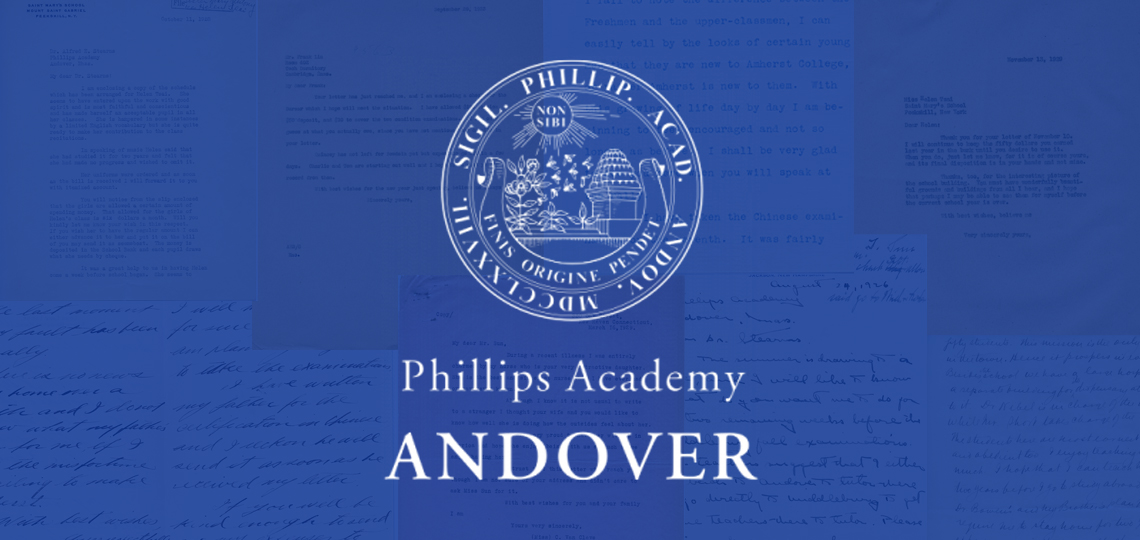
Paige Roberts of Phillips Academy in Andover, Massachusetts kindly took the time to answer questions from Sara Brumfield of FromThePage, and discussed their project and experience using the platform.
Roberts is the Director of Archives and Special Collections at Phillips Academy.
First, tell us about your documents.
One of several Phillips Academy Archives collections on FromThePage, Head of School Stearns’s Correspondence with Chinese Students, comprises documents from our project and related digital humanities course on the history of Chinese students at Andover.
Chinese boys and girls attended Phillips Academy and neighboring Abbot Academy from 1903 to 1930 through the personal efforts of Andover’s principal, Alfred Stearns. Study abroad generated enormous interest during this era in China, and the World Chinese Students Federation was organized in Shanghai in 1905.
Twice during these years the U.S. branch of the Federation held its annual conference at Phillips Academy. This collection comprises folders of correspondence between Stearns and Chinese students and their parents before, during, and after their time at Andover. Most of the letters from Chinese students are handwritten, while those from Stearns were usually typewritten.
What are your goals for the project?
Our larger project on the history of Chinese students at Andover, 1878-2000, has involved scanning and cataloging all the relevant archival records, which we have completed thanks to an internal grant and financial support from an anonymous donor. We will build a robust web site to share the documents, transcriptions, historical context, lesson plans for teachers, our current students’ data visualizations, and other information.
Having the documents transcribed enables us to ask different questions and to automate larger-scale data exploration of the primary sources. We are considering teaching a revised version of the course, “Filling the Gaps,” that would use ethnographic methods—oral history interviews with Chinese students who came to Andover from the Harbin Institute of Technology, 1980-1995, and with descendants of early 20th-century Chinese alumni—to further explore and address absences in the Archives.
How are you recruiting or finding volunteers/collaborators?
Students in our course, “Silences and Gaps: The Record of Chinese Students in the Phillips Academy Archives,” have started transcribing some of the documents, focusing mostly on typewritten ones that are easier to read.
In October 2020, we presented about our project and the course to 120 Andover students, alumni, and parents in Hong Kong and China. We plan to host a virtual transcribathon in 2021, as a community engagement event, to enable members of our school community to help transcribe these documents.
Can you share your experience using FromThePage?
During the past couple of years, students in a United States History course at Andover have really enjoyed transcribing Phillips Family Papers, 18th-century correspondence of the school’s founding family, which I had uploaded to another site.
But using FromThePage is a much more efficient and intuitive way for students to transcribe.
FromThePage is such a feature-rich, easy-to-use platform that using it for archival records about early Chinese students has been a worthwhile, key phase of our larger project. We have been so fortunate to have FromThePage to keep people engaged with the Archives remotely during the pandemic.
How does FromThePage & crowdsourcing fit within a secondary school setting?
We are very fortunate to have wonderful archival collections (old and deep) and considerable financial resources to preserve and share them.
Like many archives at the university level, we are eager for students to use archival collections in an intellectually rigorous way. Students and alumni find that crowdsourcing transcription is fun and interesting, as well as academically substantive.
What would you tell folks considering a similar project?
We considered creating our own transcription platform, but now that we use FromThePage, I am thrilled to be able to take advantage of all the knowledge and skill that has gone into developing and improving. It is a very intuitive platform for archives and volunteers.
